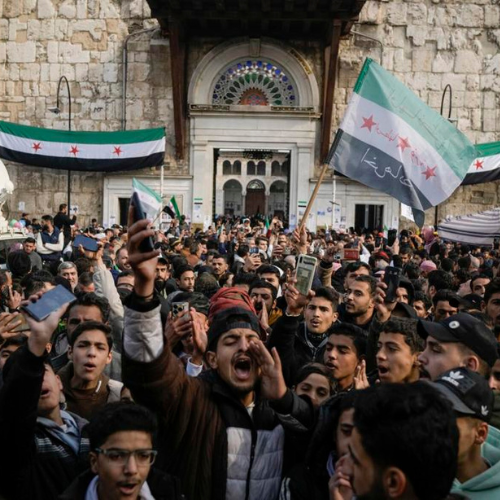In an unexpected turn of events, the United States has lifted a $10 million bounty on the leader of Syria’s interim government, a figure previously associated with extremist groups. This decision came after U.S. diplomats held formal talks with him in Damascus, marking a significant moment in the complex relationship between the two nations.
During the meeting, U.S. officials sought assurances that Syria would not become a hub for terrorist activities threatening the West or its neighboring countries. The leader of the interim government, who now heads a group that once had ties to al-Qaeda, pledged to uphold this commitment.
U.S. diplomats described the discussions as “good” and “thorough,” signaling cautious optimism about Syria’s post-war recovery. Barbara Leaf, a top U.S. official for Middle East affairs, explained that removing the bounty was necessary to enable productive dialogue. She added, “If we’re sitting down for discussions, it’s incoherent to maintain a bounty on the individual we’re negotiating with.”
The meeting addressed broader regional concerns, Syria’s humanitarian crisis, and its path toward stability. The interim government’s leader emphasized his intention to create an inclusive government and rebuild Syria’s economy, pushing for the removal of international sanctions that have heavily burdened the country.
The Long Road From Extremism to Diplomacy
Syria has been ravaged by a brutal civil war since 2011, which began with pro-democracy protests against the former regime. The conflict has left millions displaced, devastated the country’s infrastructure, and created a complex political landscape.
The leader of the interim government has had a controversial history. His group, formerly known as the Nusra Front, was an affiliate of al-Qaeda before formally cutting ties in 2016. Despite this, it remains on U.S. and United Nations terrorist designation lists. The group, now rebranded, seeks legitimacy and aims to distance itself from its extremist roots.
IMF Says It Can Help Syria Rebuild, But Stability Is Key
During the talks, U.S. officials made it clear that actions, not words, would determine any future changes to the group’s designation or the lifting of sanctions. The leader of the interim government vowed to prioritize Syria’s economic recovery and promised to govern in an “inclusive” and responsible way.
In a bid to gain international trust, the Syrian leader also highlighted his support for women’s education and pledged to protect the rights of all Syrians, including minorities. This was a notable statement given the country’s deeply conservative and conflict-ridden history.
The United States and European nations have imposed heavy sanctions on Syria since the start of the war, targeting the previous regime’s brutal crackdown on civilians. These sanctions remain a significant obstacle for Syria’s new leadership, who argue that they hinder reconstruction and the delivery of much-needed aid.
Renewed Efforts to Locate Missing Americans
Beyond political and economic issues, the talks also focused on the plight of missing Americans, including journalist Austin Tice. Tice was kidnapped in Syria in 2012 while covering the war, and his whereabouts remain unknown.
Roger D. Carstens, the U.S. envoy for hostage affairs, attended the meeting to seek the interim government’s help in locating Tice and other Americans believed to be detained in Syria. He emphasized the importance of cooperation in gaining access to areas previously controlled by the former regime.
Syria’s Struggle: UN Demands End to Crushing Sanctions
Carstens revealed startling information about the number of secret prisons that existed under the previous regime, describing their network as “vast” and estimating the existence of more than 40 detention facilities. The interim government has pledged to assist in identifying these locations and uncovering the fates of missing individuals.
Calls for Humanitarian Relief and Sanctions Review
At the international level, the United Nations has urged Syria’s interim government to take clear and measurable steps toward securing sanctions relief. U.N. officials stressed the need for humanitarian aid to flow unimpeded, warning that millions of Syrians are suffering from the effects of the war and economic collapse.
Meanwhile, international aid experts have called for counterterrorism measures, like sanctions, to avoid interfering with critical relief efforts. The situation in Syria remains dire, with millions reliant on foreign assistance for survival.
This meeting between U.S. officials and Syria’s new leadership underscores the delicate balance between addressing humanitarian needs and ensuring regional security. It also marks a cautious step toward reconciliation after years of hostility. While the United States has removed the bounty, the group’s terrorist designation remains intact, leaving many questions about the future of these fragile talks.
For now, the focus remains on rebuilding trust and addressing urgent needs in a country that has endured over a decade of war and suffering.


